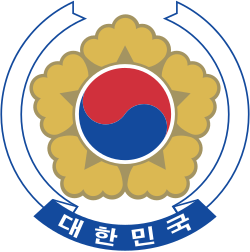| # | Year | Winner | 2nd | 3rd | Notes |
|---|
| First Republic |
| President and vice president elected indirectly by the National Assembly [8] |
| 1 | 1948 | Syngman Rhee
NARRKI
(91.8%) | Kim Koo
Korea Independence
(6.7%) | | In the vice-presidential election, Yi Si-yeong (NARRKI) won over Kim Koo by 57.4% to 33.0%. |
| President and vice president elected by popular vote |
| 2 | 1952 | Syngman Rhee
Liberal
(74.6%) | Cho Bong-am
Independent
(11.4%) | Yi Si-yeong
Democratic Nationalist
(10.9%) | The election took place during the Korean War. In the vice-presidential election, independent Ham Tae-young won the election with 41.3%, defeating Liberal candidate Lee Beom-seok (25.5%) and Democratic Nationalist Chough Pyung-ok (8.1%). |
| 3 | 1956 | Syngman Rhee
Liberal
(70.0%) | Cho Bong-am
Independent
(30.0%) | | In the vice-presidential election, Democratic Party candidate Chang Myon defeated Lee Ki-poong (Liberal) by 46.4% to 44.0%. |
| – | Mar
1960 | Syngman Rhee
Liberal
(100%) | | | Rhee re-elected unopposed due to the death of his Democratic Party opponent Chough Pyung-ok. In the vice-presidential election, Lee Ki-poong (Liberal) won with 79.2% over Chang Myon (Democratic) with 17.5%. The results of both elections were annulled as fraudulent after the April Revolution. |
| Second Republic |
| President elected indirectly by both houses of the National Assembly; Vice Presidency abolished |
| 4 | Aug
1960 | Yun Posun
Democratic
(82.2%) | Kim Chang-sook
Independent
(11.5%) | | The only presidential election of the Second Republic. |
| Third Republic |
| President elected by popular vote |
| 5 | 1963 | Park Chung-hee
Democratic Republican
(46.6%) | Yun Posun
Civil Rule
(45.1%) | | First election after the May 16 coup. |
| 6 | 1967 | Park Chung-hee
Democratic Republican
(51.4%) | Yun Posun
New Democratic
(40.9%) | | |
| 7 | 1971 | Park Chung-hee
Democratic Republican
(53.2%) | Kim Dae-jung
New Democratic
(45.3%) | | |
| Fourth Republic |
| President elected by the National Conference for Unification |
| 8 | 1972 | Park Chung-hee
Democratic Republican
(100%) | | | First election after the October Yushin. Park re-elected unopposed. |
| 9 | 1978 | Park Chung-hee
Democratic Republican
(100%) | | | Park re-elected unopposed. |
| 10 | 1979 | Choi Kyu-hah
Independent
(100%) | | | First election after the assassination of Park Chung-hee. Acting President Choi elected as President unopposed. |
| 11 | 1980 | Chun Doo-hwan
Independent
(100%) | | | First election after the coup d'état of December Twelfth. Chun elected unopposed. |
| Fifth Republic |
| President elected indirectly |
| 12 | 1981 | Chun Doo-hwan
Democratic Justice
(90.2%) | Yu Chi-song
Democratic Korea
(7.7%) | | The only presidential election of the Fifth Republic. |
| Sixth Republic |
| President elected by popular vote |
| 13 | 1987 | Roh Tae-woo
Democratic Justice
(36.6%) | Kim Young-sam
Reunification Democratic
(28.0%) | Kim Dae-jung
Peace Democratic
(27.0%) | First free and fair direct presidential election in South Korean history. [9] Also the first election to feature a female candidate. [10] |
| 14 | 1992 | Kim Young-sam
Democratic Liberal
(42.0%) | Kim Dae-jung
Democratic
(33.8%) | Chung Ju-yung
Unification National
(16.3%) | |
| 15 | 1997 | Kim Dae-jung
National Congress
(40.3%) | Lee Hoi-chang
Grand National
(38.7%) | Lee In-je
National New
(19.2%) | |
| 16 | 2002 | Roh Moo-hyun
Millennium Democratic
(48.9%) | Lee Hoi-chang
Grand National
(46.6%) | | |
| 17 | 2007 | Lee Myung-bak
Grand National
(48.7%) | Chung Dong-young
United New Democratic
(26.1%) | Lee Hoi-chang
Independent
(15.1%) | |
| 18 | 2012 | Park Geun-hye
Saenuri
(51.6%) | Moon Jae-in
Democratic United
(48.0%) | | First female president elected in South Korean history.
First election since democratization where a candidate won an absolute majority of the vote. |
| 19 | 2017 | Moon Jae-in
Democratic
(41.1%) | Hong Jun-pyo
Liberty Korea
(24.0%) | Ahn Cheol-soo
People's
(21.4%) | Held after the impeachment and removal of Park Geun-hye. |
| 20 | 2022 | Yoon Suk Yeol
People Power
(48.6%) | Lee Jae-myung
Democratic
(47.8%) | | |
| 21 | 2025 | Lee Jae-myung
Democratic
(49.42%) | Kim Moon-soo
People Power
(41.15%) | Lee Jun-seok
Reform
(8.34%) | Held after the impeachment and removal of Yoon Suk Yeol. |
